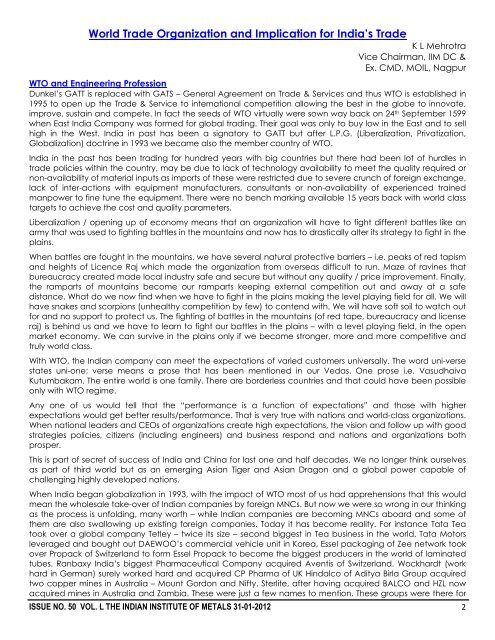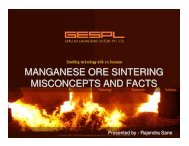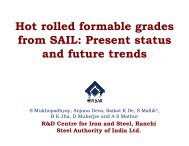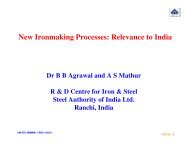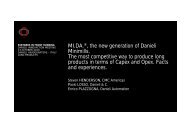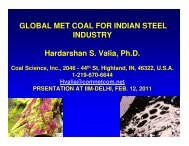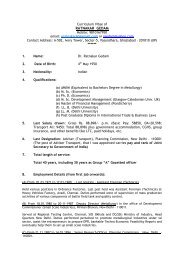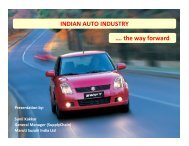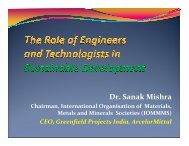Issue No. 50/2012 Vol. L âMonthlyâ Date: 31.01.2012 ... - IIM
Issue No. 50/2012 Vol. L âMonthlyâ Date: 31.01.2012 ... - IIM
Issue No. 50/2012 Vol. L âMonthlyâ Date: 31.01.2012 ... - IIM
Create successful ePaper yourself
Turn your PDF publications into a flip-book with our unique Google optimized e-Paper software.
World Trade Organization and Implication for India’s Trade<br />
K L Mehrotra<br />
Vice Chairman, <strong>IIM</strong> DC &<br />
Ex. CMD, MOIL, Nagpur<br />
WTO and Engineering Profession<br />
Dunkel’s GATT is replaced with GATS – General Agreement on Trade & Services and thus WTO is established in<br />
1995 to open up the Trade & Service to international competition allowing the best in the globe to innovate,<br />
improve, sustain and compete. In fact the seeds of WTO virtually were sown way back on 24 th September 1599<br />
when East India Company was formed for global trading. Their goal was only to buy low in the East and to sell<br />
high in the West. India in past has been a signatory to GATT but after L.P.G. (Liberalization, Privatization,<br />
Globalization) doctrine in 1993 we became also the member country of WTO.<br />
India in the past has been trading for hundred years with big countries but there had been lot of hurdles in<br />
trade policies within the country, may be due to lack of technology availability to meet the quality required or<br />
non-availability of material inputs as imports of these were restricted due to severe crunch of foreign exchange,<br />
lack of inter-actions with equipment manufacturers, consultants or non-availability of experienced trained<br />
manpower to fine tune the equipment. There were no bench marking available 15 years back with world class<br />
targets to achieve the cost and quality parameters.<br />
Liberalization / opening up of economy means that an organization will have to fight different battles like an<br />
army that was used to fighting battles in the mountains and now has to drastically alter its strategy to fight in the<br />
plains.<br />
When battles are fought in the mountains, we have several natural protective barriers – i.e. peaks of red tapism<br />
and heights of Licence Raj which made the organization from overseas difficult to run. Maze of ravines that<br />
bureaucracy created made local industry safe and secure but without any quality / price improvement. Finally,<br />
the ramparts of mountains become our ramparts keeping external competition out and away at a safe<br />
distance. What do we now find when we have to fight in the plains making the level playing field for all. We will<br />
have snakes and scorpions (unhealthy competition by few) to contend with. We will have soft soil to watch out<br />
for and no support to protect us. The fighting of battles in the mountains (of red tape, bureaucracy and license<br />
raj) is behind us and we have to learn to fight our battles in the plains – with a level playing field, in the open<br />
market economy. We can survive in the plains only if we become stronger, more and more competitive and<br />
truly world class.<br />
With WTO, the Indian company can meet the expectations of varied customers universally. The word uni-verse<br />
states uni-one; verse means a prose that has been mentioned in our Vedas. One prose i.e. Vasudhaiva<br />
Kutumbakam. The entire world is one family. There are borderless countries and that could have been possible<br />
only with WTO regime.<br />
Any one of us would tell that the “performance is a function of expectations” and those with higher<br />
expectations would get better results/performance. That is very true with nations and world-class organizations.<br />
When national leaders and CEOs of organizations create high expectations, the vision and follow up with good<br />
strategies policies, citizens (including engineers) and business respond and nations and organizations both<br />
prosper.<br />
This is part of secret of success of India and China for last one and half decades. We no longer think ourselves<br />
as part of third world but as an emerging Asian Tiger and Asian Dragon and a global power capable of<br />
challenging highly developed nations.<br />
When India began globalization in 1993, with the impact of WTO most of us had apprehensions that this would<br />
mean the wholesale take-over of Indian companies by foreign MNCs. But now we were so wrong in our thinking<br />
as the process is unfolding, many worth – while Indian companies are becoming MNCs aboard and some of<br />
them are also swallowing up existing foreign companies. Today it has become reality. For instance Tata Tea<br />
took over a global company Tetley – twice its size – second biggest in Tea business in the world. Tata Motors<br />
leveraged and bought out DAEWOO’s commercial vehicle unit in Korea, Essel packaging of Zee network took<br />
over Propack of Switzerland to form Essel Propack to become the biggest producers in the world of laminated<br />
tubes. Ranbaxy India’s biggest Pharmaceutical Company acquired Aventis of Switzerland. Wockhardt (work<br />
hard in German) surely worked hard and acquired CP Pharma of UK Hindalco of Aditya Birla Group acquired<br />
two copper mines in Australia – Mount Gordon and Nifty. Sterlite, after having acquired BALCO and HZL now<br />
acquired mines in Australia and Zambia. These were just a few names to mention. These groups were there for<br />
ISSUE NO. <strong>50</strong> VOL. L THE INDIAN INSTITUTE OF METALS 31-01-<strong>2012</strong> 2


